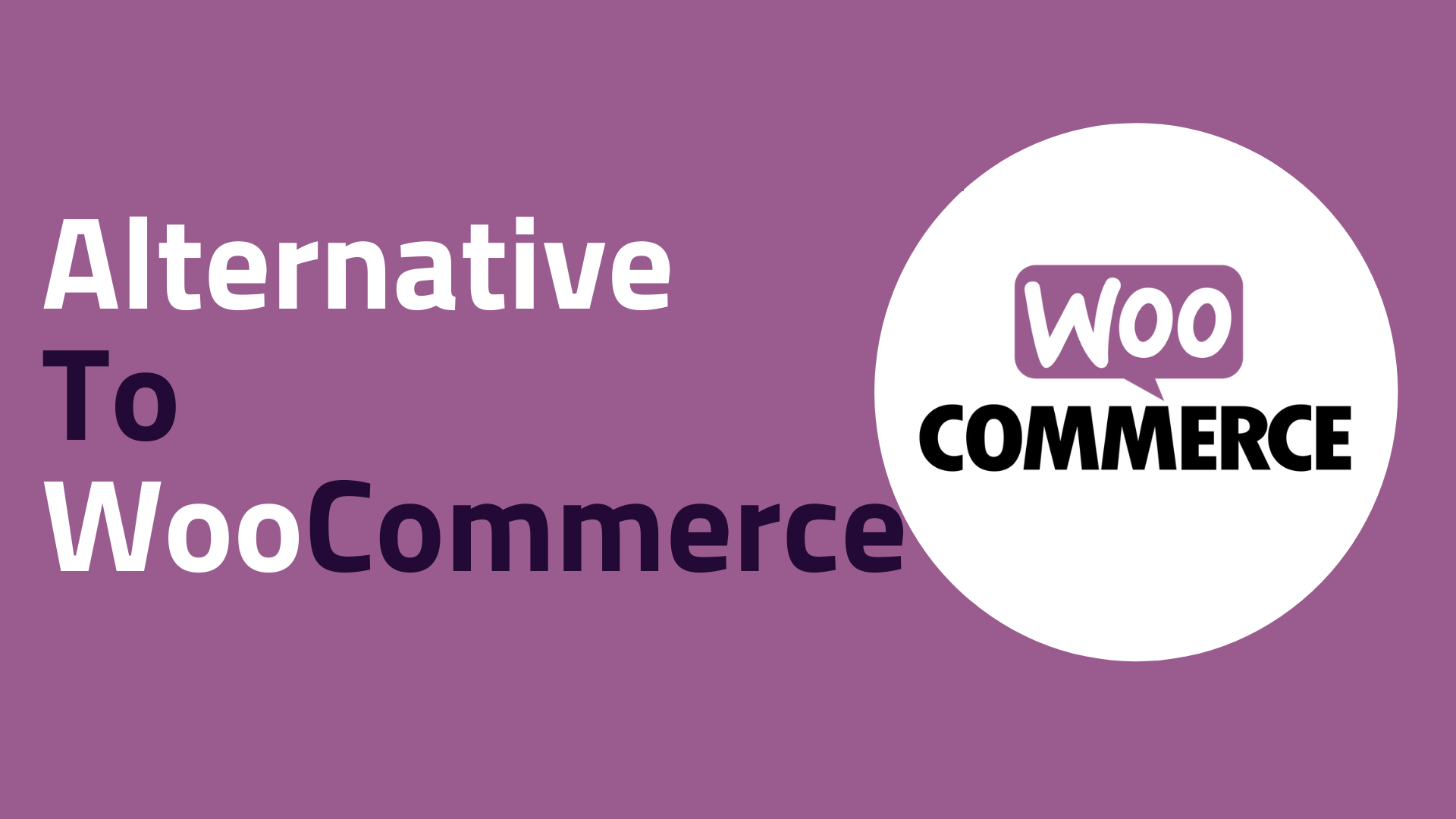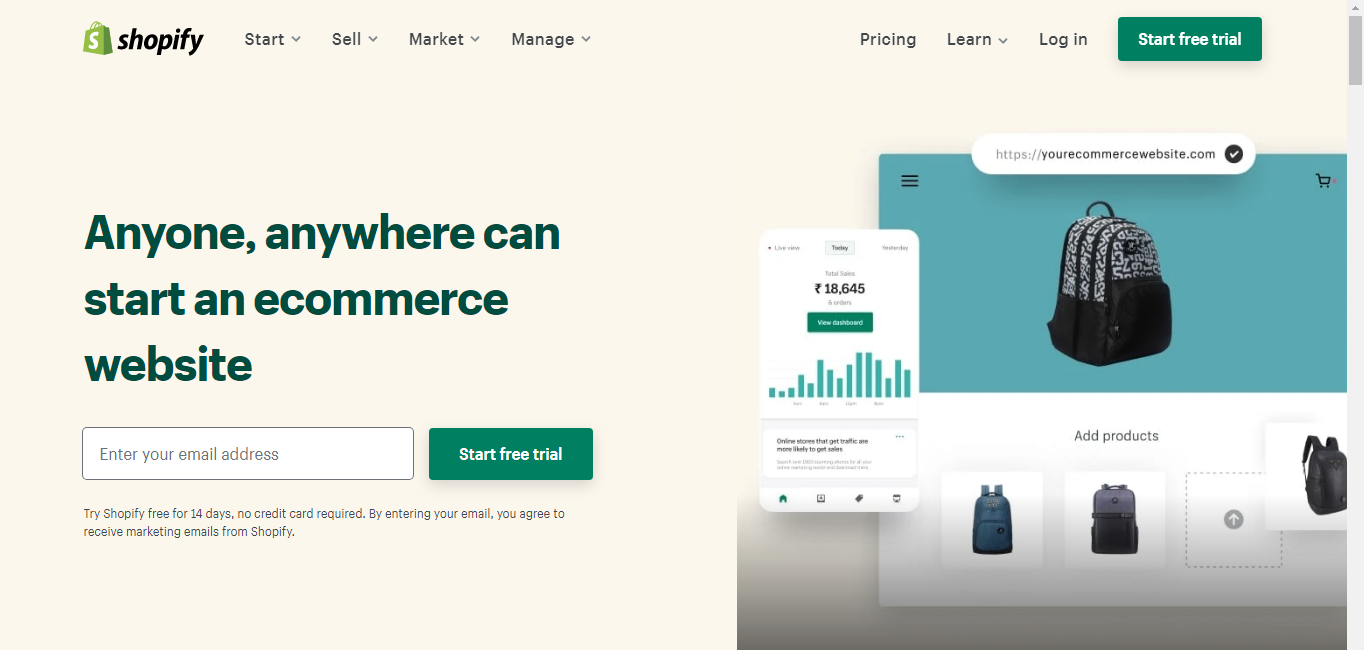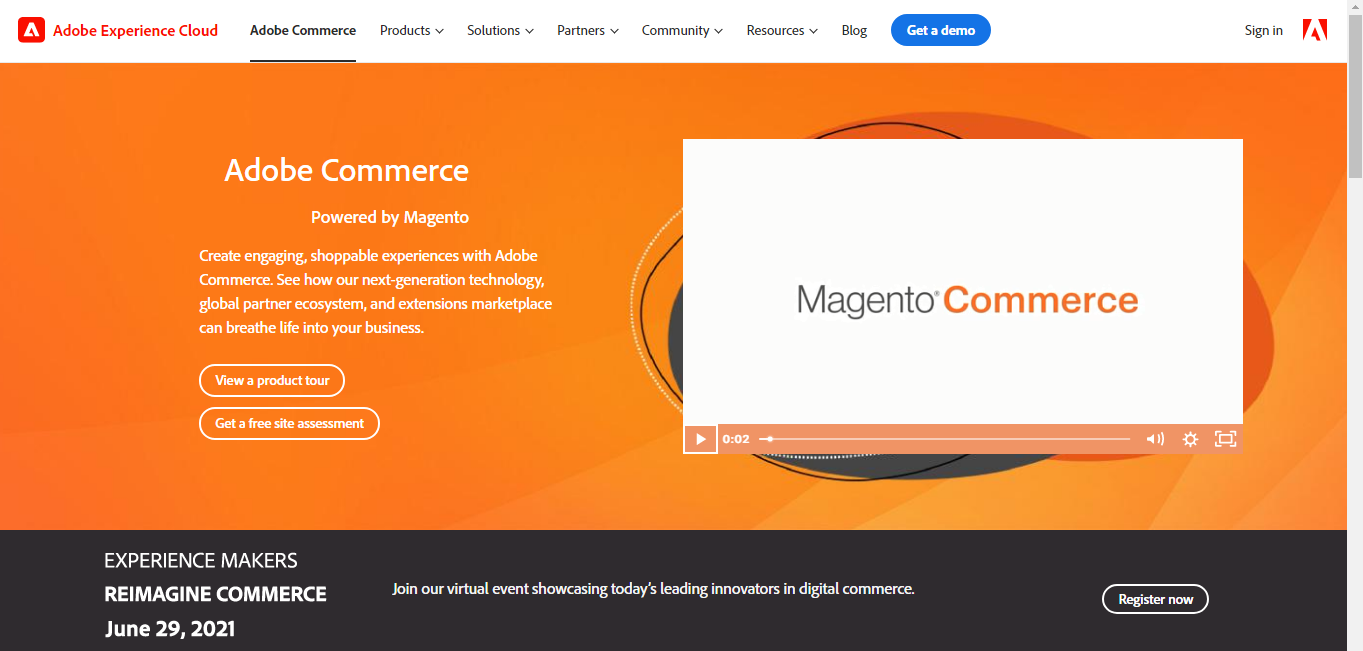
Alternative To WooCommerce
Posted onAmong the most obvious choices for eCommerce selling is WooCommerce. WooCommerce is an easy-to-use plugin for WordPress that simplifies the process of selling online by blending powerful features with an intuitive interface.
WooCommerce, as an ecommerce plugin, requires a pre-existing site before it will function as a payments plugin. Thankfully, WooCommerce is very easy to use, and it can be tailored to meet the needs of a wide range of companies.
It's clear that WooCommerce isn't the right tool for everyone, despite how amazing it can be. In addition to WordPress plugins, there are also dozens of other options for e-commerce websites. Our list was made for that reason.
You'll find below a list of WooCommerce alternatives that offer a wide range of features that can help you make your fortune online.
This article discusses a little bit about WooCommerce and some of our favorite WooCommerce alternatives.
What are you waiting for? That's great! Let's get started.
Is WooCommerce for you?
It has 67% of the market share, and WooCommerce is WordPress' official digital store plugin. So, let's discuss the pros and cons.
Open-source software has the advantage of being much more efficient, less expensive, and much easier to use than its competitors.
WooCommerce provides access to:
Plugins for the marketplace
Integrating a blog
Theme editing
Accounts can be exported
A mobile-friendly web design
Users can create accounts with you
Payments can be accepted in multiple currencies
WooCommerce has a lot to offer! Here are just a few!
Pros
Okay, here's a quick rundown of the perks WooCommerce users enjoy:
The majority of WooCommerce features are free: WooCommerce comes with the GPL (General Public License). As a result, it can be used by anyone with a WordPress website.
It comes with a ton of themes: You can customize your online store with a WooCommerce template. Many of these options are completely free! You can also use a premium theme. However, you'll have to pay for them. WooCommerce is well known for this feature. A good web design does not require you to be an expert. It's pretty easy to customize these themes.
In addition to the benefits just mentioned, WooCommerce is extremely easy to use. But even if you get stuck, there are videos to help you along. Best of all, Woocommerce's user-friendly interface is not just beneficial to you as a merchant, but is also well regarded by consumers. Shoppers don't want to deal with complicated websites. That's a surefire way to damage your conversion rate!
Cons
Not everything is free: Yes, all the essential extensions are for free. You must, however, purchase these add-ons if you want access to more advanced features.

We have already mentioned that there are several WooCommerce alternatives on the market. It all depends on your business needs. Keeping this in mind, here are some of our favorite alternatives to WooCommerce. There are several noteworthy points:
- eStoreApp.
- Wix
- Shopify
- Square Online
- Squarespace
- Ecwid
- BigCommerce
- Magento
These solutions offer some of the most important features. In this way, you'll get a better sense of which of these WooCommerce alternatives is right for you.
Let's get to work...
1. eStoreApp

eStoreApp is India’s leading SAAS platform which help you to launch your online store in few seconds. Start your e-commerce store with a few easy steps. Create products, set categories, connect a payment gateway as COD and publish your sparkling new e-commerce site!
With eStoreApp’s easy share option, you can grow your business by sharing your beautiful products on social media platforms like Instagram, Facebook and major messaging app like WhatsApp, WhatsApp for Business, Telegram, Messenger, etc.
Pros
eStoreApp is Free to create online store.
easy to use.
social media integration
custom domain support.
google analytics and facebook pixel enabled for stores.
email support is available
Cons
limited themes available.
no shipping option
2. Wix

Among all the WooCommerce alternatives on this list, Wix offers the most paid plans. It's also worth noting; you can pay for your Wix subscription on either a monthly or yearly basis. One of Wix's most expensive bundles offers a special discount on the total price.
Easy customization is a hallmark of Wix themes. Almost anything can be changed! Additionally, each template is mobile-friendly. There is a wide range of marketing tools available in Wix's plans, as well as AI design, both of which can be helpful when setting up an online store.
Let's review their different plans:
- Unlimited plan ($22 per month): This is an excellent option for small businesses and entrepreneurs. An additional fee will be charged for a few premium applications and 10GB of storage.
- Pro plan: If you plan to develop a marketing strategy, you should take this plan into consideration. For $27 per month, you can take advantage of SEO support, social media, live chat, and notifications to expand your market.
- VIP plan: An affordable plan will provide priority assistance and better telephone support. There is a monthly fee of $47 for this plan. It is a great tool if you are looking for an email marketing campaign that is high-performing.
- Business Basic plan: With your online store, you get no commission, no Wix ads, unlimited storage, unlimited bandwidth, as well as Google analytics. All for just $28 a month. Here is where you need to start if you want your online store to accept payments.
- Business Unlimited plan: Ecommerce is Wix's most popular plan. For only $4 extra per month, you can upload 10 hours of video, get 35GB of storage, and use promotional tools. The monthly fee is $33.
- Business VIP plan: Adding 50GB of storage, 30 hours of video, and VIP prioritizing options for your business will cost you $56 per month.
3. Shopify

Eight hundred thousand enterprises around the world trust Shopify with their brand. It truly is a complete alternative to WooCommerce. A wide variety of paid plans and features are available to fit the budgets and needs of a wide range of entrepreneurs.
Your Shopify store comes with a mobile app and full control over your online store. This comes in especially handy for business owners always on the go!
Here are Shopify's different pricing plans:
Basic : A Shopify website gives you the ability to list and sell any number of products. Your site will also have an integrated blog, 24/7 support, and two staff accounts. Even discount codes can be populated, so you can host product promotions easily!
Shopify Plan : You get the same functionality as the 'Basic' package, but you also get five staff accounts, gift cards for customers, and reports that look professional.
Shopify Advanced: Again, you'll get everything from the previous two bundles plus 15 staff accounts, unlimited Shopify POS staff PINs, and pre-calculated third-party shipping costs.
Each Shopify plan includes the following features:
Support for hardware
Analyse of fraud
Shopify POS is accessible
4. Square Online

A square POS device and a square card reader are more commonly associated with the company. If you’ve ever run an offline store or pop-up shop, you’ll probably feel right at home with Square. Equipped with its own free online store builder, Square Online makes it quick and simple to get online, or even create a combined online and offline strategy
With Square's online store builder, you can expect the same level of simplicity and support. A small transaction fee will apply for each transaction, but the builder itself is free to use. Additionally, Square comes with a range of plugins that you can use to simplify and enhance your online selling strategy. This product may have a higher learning curve than other solutions, however
Let's take a look at Square's pricing plans
As mentioned above, Square Online is free to use if you’re using Square already. Setting up an account is free of charge. The people who use your online store will pay a fee every time they order something.
For budding business owners, the transaction fee may make things more challenging because they cannot predict the amount they will pay each month.
You can quickly accumulate transaction fees if you don't watch your money. Typically, they charge about 2.5% per transaction. You can also upgrade your store if you need a certain feature.
5. Squarespace

Squarespace is known for providing some of the best customer support in the industry, since they were founded in 2003. Moreover, their website design has been recognized. Overall, squarespace is a great place to start if you are looking for something different. Costs are low, and the benefits are plentiful.
Four paid-for options are available: Personal, Business, Basic Commerce, and Advanced Commerce.
Personal Plan ($12 per month): This plan comes with a free custom domain and excellent SSL security. There is also unlimited storage and bandwidth space, as well as two staff accounts.
With the Business Plan ($18 per month), you get everything in the Personal package, plus a professional Gmail account. In addition, CCS and JavaScript can be used to fully customize your website. Revenue can also be generated from site analytics.
The transaction fee is 3%.
Basic Commerce Plan ($26 per month): You can take advantage of the benefits of the other two plans with the Basic Commerce Plan ($26 per month). Your clients will be able to create user accounts for your site, and Xero is integrated. You can also sell your products on Instagram!
The Advanced Commerce module ($40/month). provides you with advanced functionality, such as email campaigns for abandoned carts, allowing your customers to use gift cards, the ability to sell subscription-based products, and much more.
Each plan includes:
Custom domains for free
Useful SEO tools
Secure SSL certificates
Squarespace is one of the best WooCommerce alternatives, both in terms of cost and benefits. The variety of services you get for the money you pay is incredibly impressive.
6. Ecwid

Ecwid, which boasts over 1.6 million users, is another excellent free ecommerce platform worth taking a look at. You can increase traffic and boost your business with Ecwid's integration of Facebook and Google marketing platforms. You can reach them by live chat or by using their mobile application to access your store. This is great for business owners on the go!
If you're not bothered by choosing from a large number of themes, it's a good option. Ecwid could be the right solution for you if you're content with a simple design.
Their dashboard is exceptionally easy-to-use and they provide excellent integration with WordPress (and similar services).
The best part of Ecwid is that it offers a number of powerful ecommerce features. It will cost you $35 per month if you're using Ecwid for business. In addition to adding up to 2500 products to your store, you will able to register two staff members and receive phone and chat support.
7. BigCommerce

You can easily set up your online store with Bigcommerce's clear directions and spotless dashboard. don't worry if you already have an online store somewhere else. The BigCommerce bulk uploader tool makes it easy to import products from other platforms to your store.
Therefore, switching to BigCommerce is a breeze. A major benefit of using BigCommerce is that it supports a wide variety of payment options at no additional cost to every plan. Additionally, it has 24/7 customer support and a variety of themes that are competitive.
Let's take a look at their plans:
Bundle Standard ($29.95 per month): In addition to an unlimited number of staff accounts, you can store files, offer products, and use bandwidth. A Bigcommerce store can also be integrated with a variety of other sales channels and provide coupons, discounts, and gift cards to your shoppers.
Plus ($79.95 a month): All of the features from the previous package are included in this plan, but it allows you to segment your customers into different groups for customized marketing materials. Additionally, you can offer shoppers a credit card to use if an abandoned cart is saved.
Pro ($249.95 per month): You also get the product filtering and sales reports available on the PRO package ($249.95 per month).
Our Enterprise Plan: (you'll receive a quote) provides comprehensive management and support services, including priority support, express routing, and strategic planning. The sales number is 1-866-991-0872 and will provide you with a customized quote.
Although Bigcommerce has improved, there is still no app for the website. Even with these disadvantages, Google Adwords continues to be an excellent tool for any business looking to grow. Their customer service is also pretty good.
8. Magento

Among the excellent alternatives is Magento. In addition to offering loads of free features to help manage your online store, it is very secure and flexible. With Magento, you can segment your customers in order to personalize the marketing materials you send to them. The user interface is easy to use, making administrative work easier.
Magento also offers tons of plugins and templates to choose from! But, it's worth noting, their paid-for plugins are costly in comparison to their competitors. Furthermore, they're reportedly not as easy to use.
Magento has two leading platforms, the Magento Community Edition and the Magento Enterprise Edition. First, it's free! Nonetheless, you will still have access to many of Magento's features. In contrast, the second plan includes all the benefits Magento offers. Large enterprises and prestigious brands rely on it. Magento's Enterprise Edition costs $22,000. You'll need a lot of money!
Free themes are available, but some of their paid-for themes cost up to $2,000, and extensions to enhance the functionality of your site range from $50 to $500!
Would you like to learn more about these alternatives to WooCommerce? These are a few of the WooCommerce alternatives you may find useful.
Some of these will depend on your location as well as your business requirements. Be sure to do your homework before you part with any cash.
In addition, there are other solutions that are highly flexible and offer a comprehensive set of tools to help you launch your first online store (or enhance one that you already have).
Review all the features and alternatives this site has to offer. By doing your homework, you will feel more at ease. You need a solution that enables you to focus on what really matters, which is running your online store as efficiently and profitably as possible.
During your review of your options, consider these questions: Is a cost-benefit comparison worthwhile? What mobile-friendly templates does this solution offer? Can they be relied upon when it comes to customer service? Can your business grow?
Once you have the answers to these questions, you'll be in a better position to choose your ideal WooCommerce alternative.